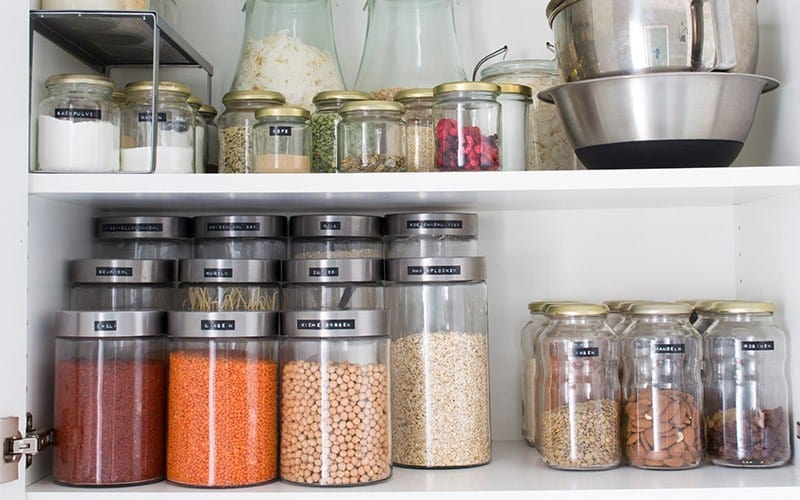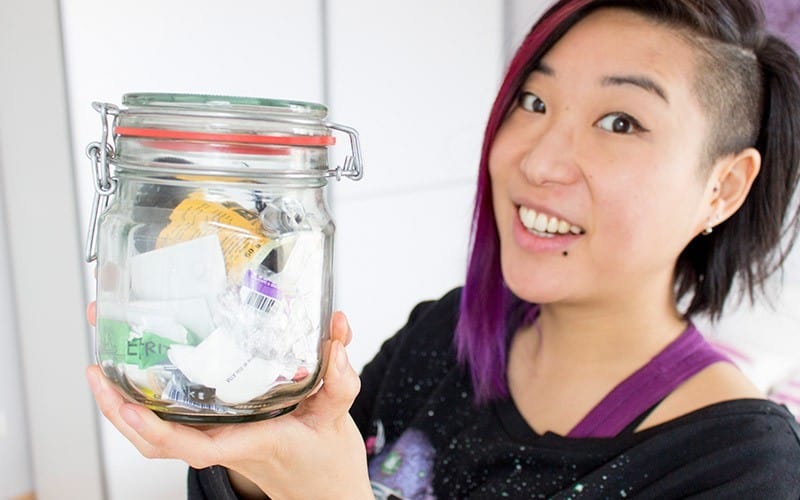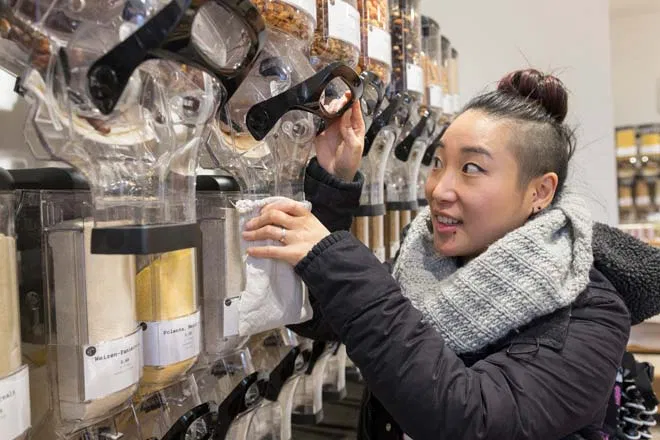Today I had an appointment for an interview with Zero Waste Expert Shia Su, who also gave me a lot of inspiration and motivation in the fight against plastic waste. Shia has been living according to the Zero Waste Lifestyle and has now cleared all the hurdles on the way to less waste. In this interview, she tells us how it all began, what motivates her, and where she sometimes reaches her limits. Have fun!
Hey Shia! Since when do you live Zero Waste and how did it come about?
In September 2014, my husband Hanno and I started to reduce our waste a bit more consistently. However, we didn't have zero waste as a goal. We thought the idea was great and very admirable, but like so many others, we thought that it couldn't be implemented in Germany. At the time, there was only one unpackaged store, and it was 500 kilometers away in Kiel. Another one in Berlin, also 500 km away, was just about to open. But given the distance, these aren't really shopping options (see also article Plastic free shopping) have been.
But when we started, we stumbled upon more and more options. We discovered home remedies for us instead of aggressive cleaners and body care products from the drugstore. However, I in particular, as a neurodermatitis and allergy-prone thing, was incredibly skeptical of this at first. However, it turned out to be the best thing I could do to my skin! And of course, the trial and error was sometimes really a bit messy and adventurous, but it was a lot of fun, because you rediscover the child in you who loves to tinker. Every single thing was also really much less complicated than we would have expected and somehow we were surprised ourselves when only so little garbage remained...
What does Zero Waste mean to you and what motivates you?

For me personally, Zero Waste is primarily about looking at my own nose. I'm not a politician or a corporate executive. I can't pass laws or decide that from now on products everywhere will be packaged in less plastic. What I actually have direct control over as a consumer is my own consumption behavior. As a consumer, you only have direct control over the last step in the entire supply chain.
However, I must also note that I honestly have a small love-hate relationship with the name "Zero" Waste, because I have the feeling that the "Zero" in it leads to much frustration. It tempts you to look deficit-oriented at the things where it doesn't work out yet, instead of being happy about the things where it does work out! Many people then also start looking for the needle in the haystack instead of seeing the potential for savings somewhere. Regardless of the term, for me personally it's about simply opting for the most sustainable option on a small scale wherever possible. Zero waste, i.e. "zero" garbage, is not an option for me either and is not possible in the existing social structures. But I do try to move in the direction of minimizing waste as much as possible. Because I would like to minimize my ecological footprint. Waste avoidance is just one of many things. I also live vegan, avoid Palm oilI don't have a car, I reduce plastic, I'm very conscious of my Energy and also look where there is still room for better decisions. But I don't make any of it perfect, it's always all work in progress 😉
I can understand 100%! What things you no longer go out of the house without?
Cloth handkerchiefs, because I am allergic, my nose runs at any time of year. Plus a small cloth bag for used handkerchiefs. Otherwise, it is with me like with the umbrella, which I also only put in when I think it might rain. If I think I'm going to eat out today or buy something to eat, I just put in a can and possibly my cutlery set. If I don't, I don't. My Drinking bottle I also have only with me when I will be on the road all day. If I only run to the health food store to do the weekly shopping I need' no water bottle, but maybe my Nets for fruit and vegetables.
I heard that you also compost. How does it work, what about the smells and what is your motivation to compost?
We have in the kitchen a Worm box. This is a box in which with the help of compost worms odorless composts (note: see also article Proper composting) can be. Yes really! This is definitely the more pleasant option compared to the normal kitchen trash can or organic waste 😉.
A worm garbage can is especially interesting for city kids like me, who have no garden and/or no organic waste garbage can in the apartment building, but also for other people who not only want to dispose of their organic waste ecologically, but also want to upcycle it. Upcycling creates from waste something more valuable than before, and the worm hummus is a very valuable and in the trade rather expensive fertilizer.
Where did you really have trouble not making trash?
In the medical and health sector, it's generally difficult. Last year, I almost cut off a piece of my fingertip while cooking on New Year's Day. Of course, there was a bit of garbage in the emergency room, and I don't argue with that either.
But that's also perfectly fine. In my opinion, there are areas in which the use of Plastic its sense. Of course, I make sure that I use home remedies wherever possible. I don't need a medicine for every little ache and I don't need a plaster for every little scratch.
However, I would not speak of "problems" here, because we are back to the deficit-oriented perspective, which the name "zero" waste unfortunately quickly leads to. How much waste remains in the end and where you can avoid waste and where you can't depends on so many factors, including what kind of infrastructure you have access to. The point is to at least work towards minimizing the visible waste - and of course there will always be limits.
I saw your jar of plastic trash from a year ago. What was in it and why?

In it, for example, is my old medical card. You can't really avoid things like that. When you need a new bank card and the like. But we have cancelled our customer cards. Apart from that, we still have fruit and vegetable stickers and a whole lot of cash register receipts, because they are often printed automatically, even in organic food stores. Since the thermal paper of sales slips is BPA-coated, they also do not belong in the paper trash, because they contaminate the things that are made from the paper.
Then there are some lids of glass bottles in it, although we prefer metal lids because they are at least recyclable. Then a small plastic bottle of our vitamin B12 tablets. As vegans, we have to supplement vitamin B12.
And of course something breaks sometimes. I am a clumsy oaf! For example, in the glass is the broken handle of a cup. The cup is otherwise fortunately still intact and is still used for shaving soap.
Super cool! Give our readers another easy start to zero waste living. What are your best tips?
- Jute bag plug in, best to put under the key
- To the unpacked Fruit & Vegetables grab, put loosely on the belt
- Glass and paper packaging prefer plastic
- Reusable instead of disposable: dishcloth/washing sponge, cloth/kitchen roll, cotton pads/washable pads
- Ask yourself: Do I really need this? Put it back and tell yourself: If I still want it in a week, I'll buy it. You'll most likely forget about it a few hours later.
Great. Thank you the Shia and see you soon!
Shia belongs with her blog Wasteland Rebel Shia Su is one of the Zero Waste pioneers and knows exactly where the hurdles lie in the Zero Waste life. I hope that the interview with Shia Su will also help you with your goal, to make less plastic waste and live in the spirit of the Zero Waste lifestyle.
Stay clean,

PS.: In the Environmental protection blog you will find many more expert tips, such as my Interview with Dr. Bernhard Bauske, the plastics expert from WWF.





